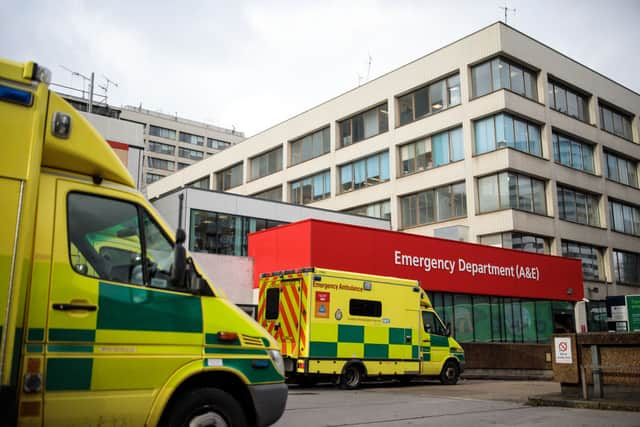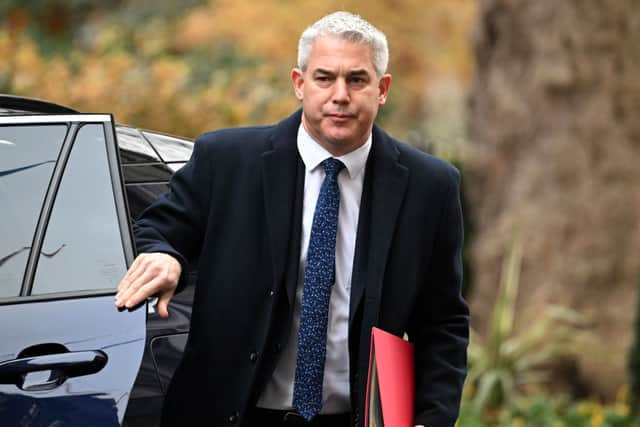Junior doctors’ strike: what should I do if my appointment is cancelled? Hospital emergency cover explained
This article contains affiliate links. We may earn a small commission on items purchased through this article, but that does not affect our editorial judgement.
and live on Freeview channel 276
Thousands of junior doctors across England have begun an unprecedented four days of strike action, resulting in the cancellation of an estimated 350,000 hospital appointments.
The British Medical Association (BMA) is staging its longest walkout yet as a bitter row over pay and conditions continues. The union, which is asking for a 35% salary increase, claimed it has had “no offer whatsoever” from Health Secretary Steve Barclay - while the Tory MP has slammed the industrial action, taking place between 11 and 15 April, as “extremely disappointing”.
Advertisement
Hide AdAdvertisement
Hide AdNHS leaders have raised serious concerns over maintaining patient safety during the strike, with Matthew Taylor, chief executive of the NHS Confederation, calling the situation “heartbreaking”. He said he hoped everyone who needed urgent care would receive it, but added: “There’s no point hiding the fact that there will be risks to patients – risks to patient safety, risks to patient dignity – as we’re not able to provide the kind of care that we want to.”
It is predicted that up to 350,000 appointments, including operations, will be cancelled - many of which have already seen huge delays on account of the coronavirus pandemic, and previous industrial action. During the 72-hour junior doctors strike last month, 175,000 appointments were scrapped.
But what should you do if your operation is cancelled, and can you still go to hospital in an emergency? Here’s everything you need to know about how to handle the junior doctors walkout - including what the NHS and the government have said.


What should I do if my appointment is cancelled?
If your hospital appointment or operation is cancelled, you will be contacted by the hospital in question to arrange a new date as soon as possible. This will be done either by telephone, text message, email, or letter.
Advertisement
Hide AdAdvertisement
Hide AdAccording to Lewisham and Greenwich NHS Trust, patients who have not heard from the hospital by Friday 12 May should contact the phone number or email address on their original appointment letter to ask about rescheduling. Other hospitals may provide specific advice on their website.
What should I do if my appointment is not cancelled?
If you have not been contacted by your hospital, you should assume your appointment is going ahead and arrive on time as planned.


Can I still go to hospital?
In an emergency, you should always call 999 or go to A&E. According to the NHS, an emergency is when something is life-threatening - including when a person has signs of a heart attack, signs of a stroke, severe difficulty breathing, and more.
Emergencies are different for adults and children. You can read about when you should call 999 here, and when you should attend A&E here.
Advertisement
Hide AdAdvertisement
Hide AdHowever, there are warnings from Dr Adrian Boyle, president of the Royal College of Emergency Medicine, that some A&Es may have to close as a result of the strikes. He told The Times: “Most A&E departments will cope but it will be very tight. There are 40 to 60% of the usual medical staff working. It has been harder to arrange cover for this strike. Consultants are human like everyone else; they have families and childcare responsibilities.
“If A&E departments are not coping they will end up closing parts of the services. They will try and stay open but provide reduced cover. We are more likely to see that this time round [than in previous strikes]. The level of disruption is greater and the strikes are longer.”
Professor Sir Stephen Powis, the national medical director of NHS England, also warned that “cover is very fragile” during this week’s strike - and urged the public, aside from for emergencies, to use healthcare services “wisely”.
He told BBC Radio 4’s Today programme: “Our advice to the public is to think carefully because we will be seeing a lot of disruption over the next four days. We are working very hard to ensure those emergency services are kept safe, that is our priority, but I’ve also got no doubt that that cover is very fragile, so we are relying on consultants and other staff to cover the work that junior doctors usually do.
Advertisement
Hide AdAdvertisement
Hide Ad“Junior doctors are a significant part of our medical workforce – up to 40 to 50% of our medical staff – and so that cover is stretched thin in places. So we will endeavour to keep patients safe, particularly in those emergency services, but that is becoming harder every time we have this strike action.”
Meanwhile, Health Secretary Steve Barclay said: “People should attend appointments unless told otherwise by the NHS, continue to call 999 in a life-threatening emergency, and use NHS 111 online services for non-urgent health needs.”
The NHS has said that those in need of medical advice in non-urgent cases should call 111 or see their GP.
Thousands of cancellations
Patients are already taking to social media to lament their appointments and operations being cancelled - but many are voicing their support for junior doctors at the same time.
Advertisement
Hide AdAdvertisement
Hide AdRose Dixon, from the West Midlands, wrote on Twitter: “Just had text message to say my hospital appointment tomorrow has been cancelled. I still support our NHS doctors and nurses! It’s the government who are causing the problem.”
Gareth Watkins, from London, echoed: “I’ve had an appointment cancelled this week because of the #JuniorDoctorsStrikes. The responsibility for this lies with the government for a decade of undervaluing and underpaying doctors. And with Steve Barclay for not taking action to resolve the matter.”
However, others feel more conflicted. Rebecca Fielden posted to social media: “Why are the junior doctors striking? Also why are they doing it now? Genuine questions; I’d like to understand. My daughter’s operation has been cancelled and the reason given was ‘due to the strikes’. I feel angry but then decided I ought to try and understand…” She added that she feels “so undecided” about whether she supports the strikes or not.
Some have expressed anger at the impact the industrial action is having. User Peter Atkinson said: “I’m not in support of the strike. Three cancelled appointments. Wife in pain and the hospital says cancellation is due to sicknes. Stop lying. It’s striking doctors.”
Advertisement
Hide AdAdvertisement
Hide AdLikewise, Danny Theobald said: “No person with cancer is happy about appointments being cancelled. Two appointments apparently cancelled could end up with you dying.”


‘No credible offer’
Dr Vivek Trivedi and Dr Robert Laurenson, co-chairs of the BMA junior doctor committee, earlier confirmed that this week’s strike would be going ahead. They said: “It is with disappointment and great frustration that we must announce this new industrial action.
“The government has dragged its feet at every opportunity. It has not presented any credible offer and is refusing to accept that there is any case for pay restoration.”
The union has argued that successive governments have overseen 15 years of real-terms pay cuts for junior doctors in England, which it says amounts to a “staggering and unjustifiable” 26.1% decline in pay since 2008/09. It says this has led to staff burnout, doctors dropping out of the workforce, and risks to patient safety.
‘Unreasonable and unrealistic’
Advertisement
Hide AdAdvertisement
Hide AdMeanwhile, Health Secretary Barclay said the BMA’s demand for a 35% pay rise is both “unreasonable” and “unrealistic”. He argued that the wage increase is “out of step” with what other health unions have recommended to their members - pointing to examples of a 5% pay rise and a one-off payment of at least £1,655 - and claimed that some junior doctors could receive an extra £20,000 a year if the union’s demands were met.
He also accused organisers of taking a “militant stance” by timing the strike just after the Bank Holiday Easter weekend, a period when the NHS already faces increased demand and greater staff absence. He said this has been done “to maximise disruption”.
The MP concluded that he wanted to “see a fair deal that increases [junior doctors’] pay”, but could see “no prospect of getting into serious and constructive talks” unless demands were changed. “If the BMA is willing to move significantly from this position and cancel strikes we can resume confidential talks and find a way forward, as we have done with other unions,” he said.
Comment Guidelines
National World encourages reader discussion on our stories. User feedback, insights and back-and-forth exchanges add a rich layer of context to reporting. Please review our Community Guidelines before commenting.
